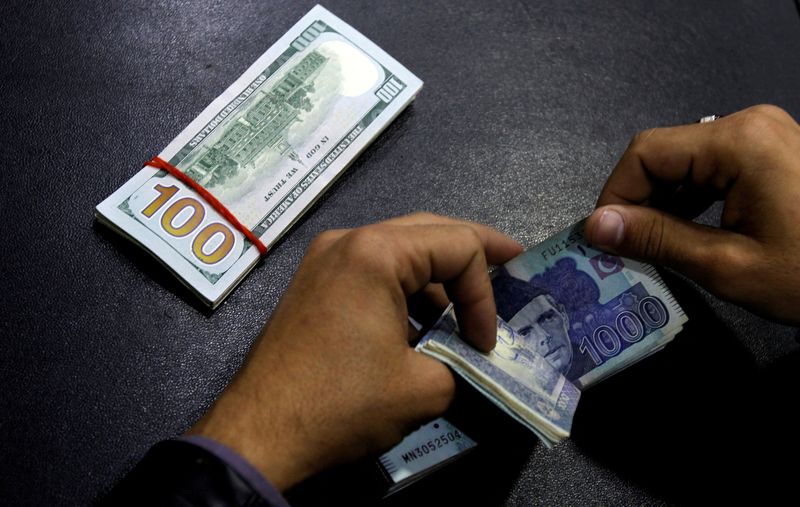By Ariba Shahid and Asif Shahzad
KARACHI, Pakistan (Reuters) -The Pakistani rupee fell 9.6% against the dollar on Thursday, central bank data showed - the biggest one-day drop in over two decades - in a slump that may persuade the International Monetary Fund to resume lending to the country.
The drop comes a day after foreign exchange companies removed a cap on the exchange rate, a key demand of the IMF as part of a programme of economic reforms it has agreed on with the cash-strapped South Asian nation.
The currency's official value closed at 255.4 rupees against the dollar versus 230.9 on Wednesday, the central bank said.
Facing an acute balance of payments crisis, Pakistan is desperate to secure external financing, with less than three weeks' worth of import cover in its foreign exchange reserves, which fell $923 million to $3.68 billion in the latest data.
Pakistan secured a $6 billion IMF bailout in 2019. It was topped up with another $1 billion last year to help the country following devastating floods, but the IMF then suspended disbursements in November due to Pakistan's failure to make more progress on fiscal consolidation.
The lender announced on Thursday that it was sending a mission to the country at the end of January to discuss resuming the programme.
Aside from wanting the government to take fiscal measures, the IMF is pushing for it to move to a market-determined exchange rate regime, which the IMF highlighted in its statement on Thursday.
'ARTIFICIAL' DISTORTIONS
The foreign exchange companies said on Wednesday that they had removed the cap for the sake of the country, because it was causing "artificial" distortions for the economy.
Wednesday's move by foreign currency dealers, whose open market rates are different from the rate notified by the central bank, had a cascade effect on official exchange rates on Thursday.
The drop in the official rate was the biggest since 1999 in both absolute and percentage terms, according to JS Global, a Pakistani brokerage house.
In the open market, the rupee weakened from 243 rupees to the dollar to 262, a drop of about 7%, having lost 1.2% the previous day, according to the Exchange Companies Association of Pakistan (ECAP) trade data.
"We requested the central bank to increase the interbank (rate) to help combat the black market," ECAP President Malik Bostan told Reuters.
The State Bank of Pakistan (SBP) and the finance ministry did not respond to a Reuters request for comment.
Attempts by Finance Minister Ishaq Dar to defend the rupee since his appointment in September, including reported currency market interventions, had run counter to the IMF's advice.
POSITIVE RESPONSE
The Pakistan Stock Exchange, however, reacted positively to the rupee's fall, with the KSE 100 index shooting up more than 1,000 points, or 2.5%.
"The depreciation in the rupee takes away some uncertainty regarding the economic roadmap ahead and resumption of the IMF programme, which the market is responding positively to," Tahir Abbass, Head of Research at Arif Habib Limited, said.
Topline Securities, a Karachi-based brokerage house, said the sharp fall in foreign exchange reserves from $8 billion in September to $4.6 billion as of Jan. 13 led to a widening in the spread between the official and open market rates, and created a black market for dollars due to the low supply.
The sudden drop in rates hit banks hard. According to two officials in commercial banks operating in Pakistan, banks that had earlier borrowed at 230 rupees to the dollar to make payments by running open positions now have to settle payments at a rate of 250 rupees.
The officials told Reuters on condition of anonymity that banks that were hit the hardest are those that did not have adequate dollar inflows.
DECADES-HIGH INFLATION
While the move increases the chances of a restart in IMF funding, Pakistan is also reeling from decades-high inflation, which economists fear will now get worse. Most of Pakistan's critical imports, including fuel, are paid for in dollars.
"It will give a significant impetus to already elevated price pressures in the economy," said Sakib Sherani, a Pakistani macroeconomist, adding that consumer price index (CPI) numbers are heading to levels previously unseen in the country.

In the first half of the current financial year, which ends in June, average inflation has been 25%. The central bank is also tightening monetary policy sharply, with key rates also at decades-high levels and growth having come to a grinding halt.
The ensuing economic crisis will also pile political pressure on the government, with former prime minister Imran Khan demanding a snap general election.